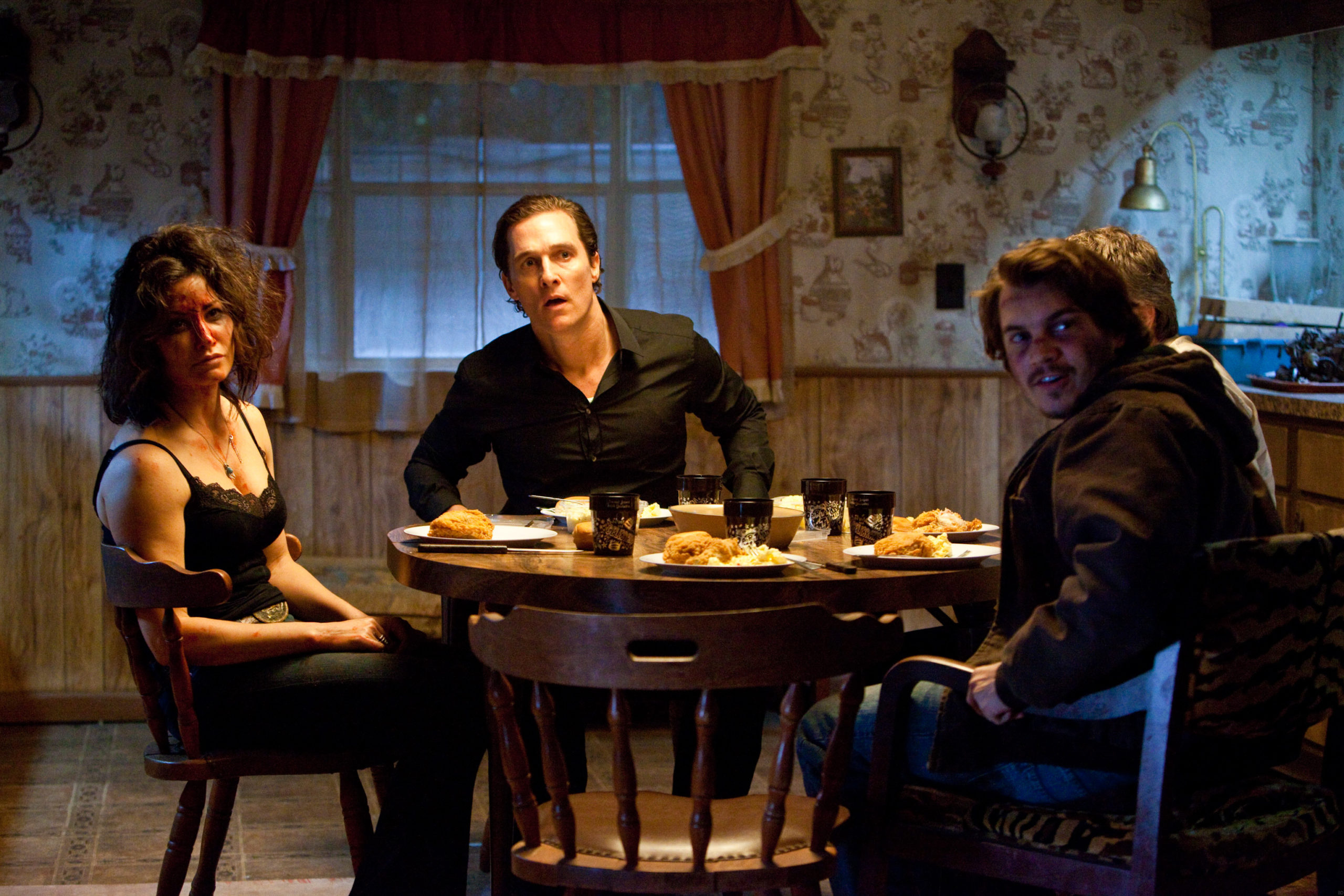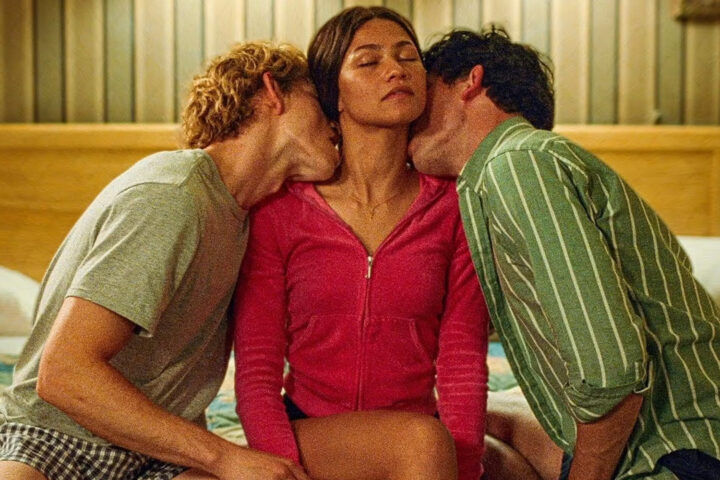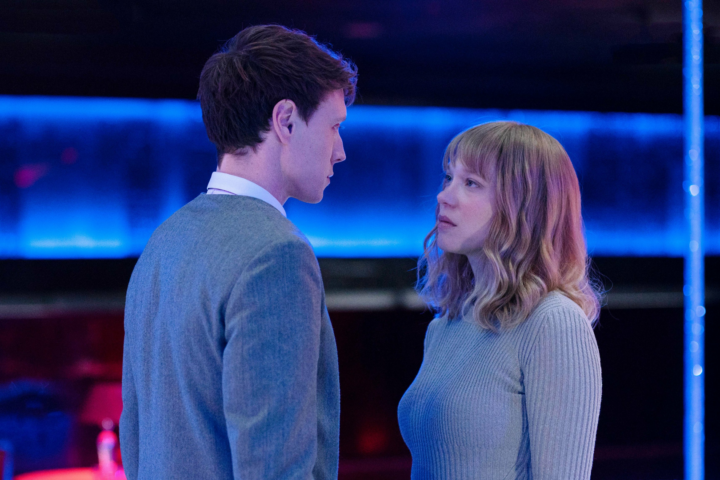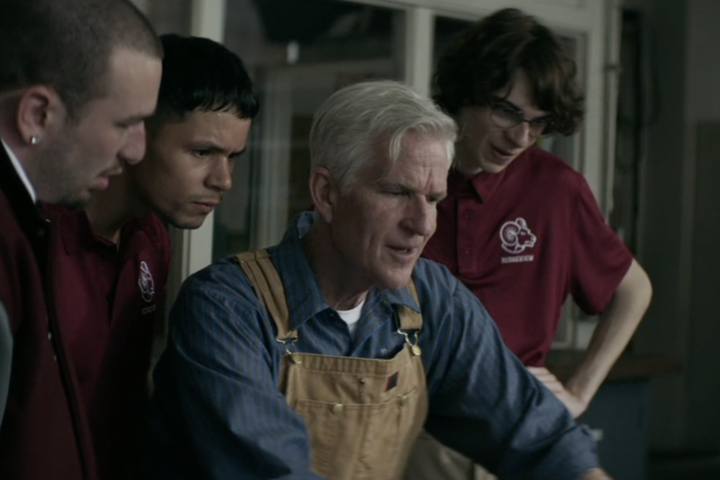Few films approach the ferocity of Tracy Letts’ Killer Joe, featuring Matthew McConaughey as a Texas sheriff and contract killer who agrees to knock off the matriarch of a (putting it nicely) working class family looking for a quick insurance payout. Loaded with scheming double-crosses, morally lapsed characters driven to desperate measures, some damned good acting and a novel scene that hints at the deflowering of a naïve young virgin while molesting a perfectly innocent chicken drumstick, the film is a harrowing look at some very dark impulses and the comeuppance meted out, with gentlemanly order, by the titular dark knight. Crime, punishment and then more crime and punishment.
Directed by William Friedkin and written by Letts, who adapted his own play, I caught up with the Pulitzer Prize winner (August: Osage County) recently to talk about his flamboyantly fascinating morality tale, ripped from headlines and informed by its sweaty Texas milieu, the chaos that Killer Joe ultimately organizes with sadism and finding humanity in the darkest corners.
Killer Joe is quite a pitch-black vision. Do you see humanity in the story?
It’s based on a play that is twenty years old now, and I was reading a lot of pulp fiction at the time. I was reading a lot of Jim Thompson, who is a good, strong pulp fiction writer originally from Oklahoma, as am I. It is very black and hardcore noir. I think one of the principal aspects of that kind of noir is people who want things really badly—who want and need and feel things really strongly, yet make some terrible decisions in their attempts to get them. Something about that is very human and we can all identify with—those moments in our lives when we have wanted something and done absolutely the wrong thing to get it. These characters are working poor. I hear them described as trailer trash or white trash, but the truth is they are working poor. They have jobs. Yet they don’t have any kind of spiritual food, it seems, and so what they believe is going to fix their problems is simply to acquire money. And they are willing to make some very bad decisions and terrible compromises to get it. The fact that they live in a moral vacuum is frightening, but in both the play and the film we never wanted to step back and point our fingers at them and say, ‘Look at these people!’ They are us; a manifestation of us; the fringe of our society making some very bad decisions.
Any thoughts on them in retrospect?
I still have great sympathy for them. I always did. I actually find them kind of touching in their own ways. I don’t know that others do, but I do. You write something like this and hope it will have some lasting power, but what you don’t realize is the way it travels through life with you and twenty years later it is like this weird child you had twenty years ago. It is so odd that I still have a relationship with this thing and I can sit and watch that movie and go, ‘Oh, man, that is some crazy shit. What was I thinking when I wrote that?’ There is some crazy, fever dream stuff going on there. I have always liked them and felt that as bad as they get, at their absolute worst, there is still something in me that sees something sad at the core of them.
I couldn’t help being reminded of Blood Simple at times.
I think Blood Simple had its roots in that same kind of pulp fiction—that dirty, southern noir. You’ll notice that the mother and father’s names are Ansel and Adele, and those are the names of the characters in William Faulkner’s As I Lay Dying, so those were influences too. And the story is also based on a true story of a murderous Florida family, and I transposed it to Texas. But the true-life story was a mother and son who were going to kill the father; they were all drug dealers. And then the father and son discovered that the mother was stealing cocaine, so they decided to kill her instead. It was just sort of the ease with which they changed their minds about which family member was going to die, and I thought you’d have to get pretty far down when family ties mean so little to you.
So you don’t see any real heroes or villains here.
I never wanted to make the black hats or the white hats. I never wanted to make an easy statement. The truth is that Joe represents a certain order, coming to this trailer, in the chaos. There are some rules of behavior that he clearly establishes. He is a man of order, and these other people are not. So when he introduces that kind of order and structure into their lives, they have a sense of, ‘Is this a good or bad guy?’ To have a moral code, as skewed as it may be, is the starting point. So I always wanted the material to ask those questions and engage in that conversation without supplying easy answers as to who was good, bad, right, wrong, in power or not.
So perhaps there are these dark impulses in all of us, awaiting triggers.
Without getting too political, I had some friends who told me recently that they wanted to take Jerry Sandusky out back and shoot him in the head. I don’t excuse or condone that guy because that is horrible, and that is a sick man. I’m more bent out of shape about the institution that protected that guy. I mean, ‘What the fuck?’
Can you discuss Matthew McConaughey’s surprising performance here? He’s really having a great year.
We always knew he was good. When I told friends that Matthew McConaughey was going to play this part, they thought it was bad news. I said, ‘I don’t think it’s bad news!’ They started listing these romantic comedies and I said, ‘I haven’t seen any of those. Those movies are not made for me. I wouldn’t go see that. On a bet I wouldn’t.’ Nothing wrong with him making the money and those movies for people who want to see them. Clearly a lot of people wanted to see those movies. I’m not the target audience for those and I never was. I remember Lone Star, A Time to Kill and Dazed and Confused, some of his best performances, set in the South, and I saw The Lincoln Lawyer Recently. The guy is great! He made a lot of movies that I am not interested in, but I wouldn’t hold that against him. He is really terrific in the film. He brings a really nice, timeless, western quality. We were doing roundtable interviews together at SXSW and this guy said, ‘Matthew, clearly you have nothing in common with Killer Joe. You are not at all like this character.’ I turned to him and said, ‘Is that true? You don’t have a little bit of that evil son-of-a-bitch inside of you?’ He said to me, ‘We just met.’ Clearly he’s got a dark side to him that likes to express himself, and that is really interesting.
Gina Gershon floored me in the final sequence regarding the chicken leg, but more by her character’s admission of vulnerability in that moment. She’s been so hardcore to that point, and at that moment she really brings the emotional goods. It’s devastating. Perhaps it is Sharla, perhaps it is Gina, but it knocked me out. It’s bound to be controversial. What are your thoughts on that scene, and how do you anticipate the reaction will be?
The title of my autobiography is going to be Defending the Chicken Leg. She is great. You know, even in my theater world, which doesn’t reach as far out as the film world, that scene has always been a lightning rod for controversy and discussion. I couldn’t be in the room when they were originally rehearing the scene in the first performance. I found it too upsetting to watch. I think theater you have to figure out how to do it eight times a week—not easily done. Gina had in fact been offered the part of Sharla in the off-Broadway production of Killer Joe and said, ‘I don’t know how I could do that eight times a week.’ But when she was offered the film, she said, ‘I can get through it once.’ She is amazing in the scene. It’s some of that fever dream stuff I was talking about. It’s brutal, shocking and horrifying and it’s also- and I will get in trouble for even saying this, I have had female audience members come up to me and tell me, ‘I found that titillating.’ I have also had female audience members come up to me and call me every name in the book—‘misogynist.’ I’ve had people suggest that I should switch the genders and the women should play the men’s roles and the men should play the women’s roles, and my response has always been, ‘What world are you living in? In my world, women have it pretty rough.’ I think Killer Joe is a reflection of that. Ultimately the gender politics break pretty hard against the women. Granted, the men in this thing are not having a picnic themselves. But when it turns against the women, it turns against them in a very, very brutal kind of way. You don’t have to look very far around the world to see that it happens in much worse ways than have a women suck on a chicken leg. What do I think the reaction is going to be? I don’t know. Movies provide a sort of ironic distance. But in the theater, when it is happening in front of you, it is horrifying. But perhaps in a movie theater, at arm’s length, they can laugh at it. I hope that people have the reaction that you had. It’s supposed to be horrifying.
To a bit lesser extent, the seduction of Dottie is also quite bracing.
The seduction of Dottie is scary and bizarre and perverse, but it is also kind of sexy. So I think it is another one of the things that make people uncomfortable—an expression of sexuality, in this instance, between this virginal figure and this killer. But come on, that’s just a good Saturday night!
You’ve worked with William Friedkin on both Bug and now Killer Joe. Give me a sense of him.
Bill is a great guy. He is a funny, outrageous guy. He is seventy-six years old and a storied career of course. From the first moment I ever met him, he has been so generous and gracious with me as a writer. You’ve seen the title card for the movie. It goes right back to The Exorcist with ‘William Peter Blatty’s The Exorcist’—he has that respect for writers. One of his first movies was an adaptation of The Birthday Party by Harold Pinter, and they stayed friends until Pinter’s death. So there is a reason that writers like working with him. He shows a real respect for the written word. The first time he had me out to his place in Los Angeles and I met him to talk about making a movie of Bug, and he told me what he was going to do and then he did everything he told me. My experience in Hollywood until then had not been that. And Billy has always been like that. When he first showed me Bug in an editing room, he said, ‘What did you think?’ I said, ‘It’s great.’ He said, ‘See anything you’d like to change?’ I said, ‘Yeah.’ He said, ‘Run the movie.’ And the editor did, and it turned into a collaboration about things that might be changed in the film. So he is not some von Stroheim figure with a riding crop, bullying his way. He is a gifted artist who knows what he wants, but also respects the collaboration of his fellow artists. I have nothing but good things to say about my collaboration with him. I am so glad I have had a chance to work with him, because he is a no-bullshit guy. He moves that camera like Samuel Fuller. It’s like a gun, the way he uses that camera. He knows what he is doing. (Cinematographer) Caleb Deschanel told me story about him. Billy is notorious for doing one or two takes, and that keeps everyone on their toes and they cannot screw up. So one day they shot a truck pulling up and Caleb said to him, ‘We have to redo that. You can see the camera crew’s reflection in the side of the truck.’ And Billy said, ‘No, we are fine. We are moving on.’ Caleb said, ‘We have only done one shot. You will see the camera crew.’ Billy said, ‘Caleb, don’t you think audiences are sophisticated enough now to know that movies are shot with movie cameras? We are moving on.’ And they did. Caleb said, ‘Of course, he was right. By the time everything was chopped up and edited, you didn’t notice it.’ If it is even still in the movie.



